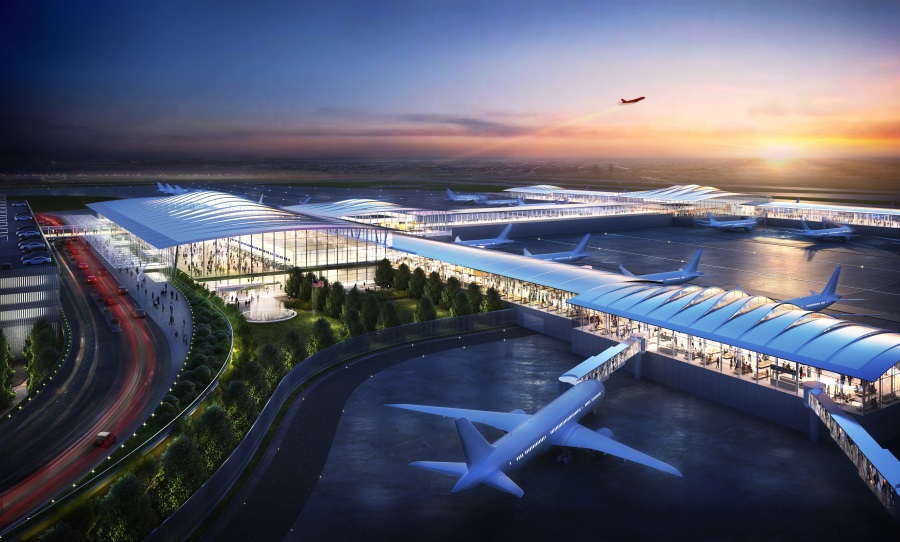The public has a right to know how its tax dollars are being spent. For airport projects, this includes bonds that are issued for construction that might later be paid back by airline or customer fees. But elected mayors and city councils also have an obligation to make sure that airport projects, in particular, have a fair selection process that's not unduly influenced by public lobbying from prospective developers and contractors. Kansas City International Airport and Chicago's O'Hare International recently showed differing approaches to transparency, neither of which was ideal.
"The City Council selected a successful proposal with no final drawings or details of the project, or solid figures about the total cost will be. This is unprecedented in publicly financed projects of this magnitude. This concept will likely result in cost overrun [with estimated costs now at $1.3 billion]."
Those were the words of retired Black & Veatch partner and executive vice president Roger W. Dutton, written in a November 4, 2017 Kansas City Star op-ed advising voters to reject a redevelopment proposal for KCI that the Kansas City Council selected the previous September. The KC Council picked a team led by Bethesda, Md.-based Edgemoor Infrastructure & Real Estate. Edgemoor was a surprise selection that beat front-runners KCI Home Team, led by engineer/developer Burns & McDonnell, and KCI Partnership, led by AECOM. Those two companies were directly or indirectly responsible for filling the airwaves, websites and even live pep rallies with statements, accusations and downright cheering to get their proposals picked by the council.
Today, Dutton's words look prescient as the cost of a new single-terminal KCI with Edgemoor has ballooned to nearly $1.9 billion, far more than its September 2017 price tag of $1.3 billion. Some are projecting even higher costs. Edgemoor has been quick to point out that the current plan provides far more airport than what was promised back in 2017. But that's only because nothing could be less than what was promised back then. There weren't even drawings submitted as part of the proposal. Meanwhile, AECOM—valiantly still vying for the contract—now says it can deliver the project for $1.1 billion, with only a few months before construction is set to begin.
At the time of selection, Kansas City Councilwoman Jolie Justus, who chairs the city's airport committee, said “when it comes to financing [the Edgemoor proposal] was frankly the lowest cost option to the city, provided the most flexibility and gave us an option for more project and less cost to the city, and throughout the entire process their financing proposal preserves the city’s credit.”
Council members also said that Edgemoor's plan to finance the project entirely out of debt, rather than take an equity stake in the project, was better for the city. Burns & McDonnell's proposal—an unsolicited offer that kick-started the current redevelopment—was rejected outright because the $50-million equity contribution it included which, the council and its corporation counsel said, would violate the city's bonding ordinance. Council members also expressed frustration with the public campaigning by AECOM and Burns & McDonnell. In particular, council members were frustrated by an accusation by Kansas City Mayor Sly James that an aide to a councilwoman was sitting too close to Monti Valrie, a consultant for AECOM, while at a meeting. Le’Shyeka Roland, an aide to Councilwoman Katheryn Shields was the accused party. During a council session Valrie had his arm around Roland, while she rested her head on his shoulder, according to the mayor. That's the kind of summer Kansas City had.
So, when the flexibility of Edgemoor's proposal did, indeed, turn out to mean higher costs for Kansas City taxpayers, it's hard to take the council's side and say that that couldn't have been predicted, considering what they picked. The fact that a well-meaning attempt at transparency turned into a process beset by public campaigning and juvenile bickering also serves as a cautionary tale about how openness and transparency can devolve into petty political sparring from interests with their own agendas when it comes to major public works projects.
Meanwhile, in Chicago, the opposite of transparency is playing out with that city's plans to spend $8.5 billion on the largest overhaul in O'Hare International Airport's 74-year history. The design teams for a new "global terminal" have been shortlisted by the Chicago Dept. of Aviation and proposals have been submitted through the city's Dept. of Procurement Services and the public even voted online on which airport design they'd like to use.
The designers/developers vying for the city project are Fentress-EXP-Brook-Garza Joint Venture Partners; Foster Epstein Moreno JV Joint Venture Partners; Santiago Calatrava LLC; SOM; and Studio ORD Joint Venture Partners. Sadly, this is not a story of Chicago doing public procurement right and giving the people a real vote. While Chicago is not allowing its procurement process to be dragged into the political mud like Kansas City's, Mayor Rahm Emanuel is taking the process 180 degrees in the other direction and will not even release the names of the selection and evaluation committee members who are deciding the fate of the five designs—supposedly to avoid the kind of lobbying that beset Kansas City's process. While Chicago Tribune Architecture Critic Blair Kamin has said one of his sources believes there are 15 people on the selection and evaluation committee, the city won't confirm that number.
The selection and evaluation committee recently heard presentations from each design team, but the people of Chicago will not ever know who those stakeholders and subject matter experts are and there will be no public report of their findings.
"The City has maintained a consistent policy of not disclosing the identities of evaluation committee members, and that is the case with this solicitation as well," said Cathy Kwiatkowski, director of public affairs for Chicago's department of procurement services. "Established RFP evaluation guidelines require that evaluation committees consist of a diverse group of members who are stakeholders and subject matter experts and committed to serving in a professional and objective manner in accordance with the established RFP evaluation guidelines."
Chicago has maintained that process under the Emanuel administration but under previous mayors there were very public competitions for projects such as the Harold Washington Library.
Emanuel said, at a press conference unveiling scale models of the designs at the Chicago Architecture Center, that he would "have an opinion” about which plan is the best one, but the unnamed selection and evaluation committee would do its job. In Kansas City's process, the public at least knows who is at fault for picking a design without enough detail for an accurate cost estimate. Not only does Chicago's process close out the taxpayers, whose money will be spent in the form of city-issued bonds that the city hopes will be paid back by ticket fees from the new terminal, but it closes out educated professionals who could caution public officials not to make mistakes such as Mr. Dutton, whose op-ed served as a warning to both the Kansas City Council and the voters that approved the project with a way-too-low bid.
For airports and other major public works projects, Kansas City and Chicago present the contrast of an open process full of all of the campaigning of a presidential election and a closed process that shuts the public out 100% that is very much in the tradition of the political back room deal. These should not be the only options for projects that will affect millions of travelers and residents who use them and, in some way, pay for them. One would hope that our city leaders and industry experts could find a better process in between those polar opposites, one that values the public's judgment and invites the opinions of experts who can offer guidance outside of the setting of a selection committee or city council. A process that is thoroughly divorced from both extremes, respects the public's right to know how its tax dollars are being used and demands a level of accuracy that's in the realm of reality from the developers and designers lobbying for these important public works jobs.




